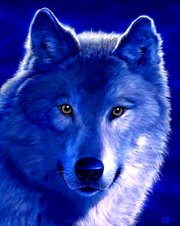
Seek & Find
Saturday, November 7, 2009
Wolves, Dogs And Mankind

Wednesday, January 2, 2008
WolfQuest Video Game, Live As A Wolf

MINNEAPOLIS (AP) - The new video game "WolfQuest" allows players to follow the call of the wild in the role of a wolf in Yellowstone National Park.
Players learn quickly, with help from realistic graphics, that wolves do a lot of running - across plains, through forests and up and down steep slopes.
"You have to learn how to hunt, survive, defend your territory and ultimately find a mate and establish your own pack," said project director Grant Spickelmier, assistant education director at Minnesota Zoo in Apple Valley.
The first episode, "Amethyst Mountain," was officially released Dec. 20 as a free download at . Spickelmier said the game had been downloaded 13,500 times by Wednesday.http://www.wolfquest.org/
The Minnesota Zoo developed "WolfQuest" with Eduweb, an educational software developer in St. Paul, on a $508,253 National Science Foundation grant. Other partners include the National Zoo in Washington, the Phoenix Zoo, Yellowstone and the International Wolf Center in Ely.
The game is aimed at ages 10 to 15 because kids that age have largely stopped going to zoos and are more interested in things like video games, Spickelmier said.
"We're hoping to capture some of those kids back with this game," he said, adding that the Minnesota Zoo also hopes to interest kids in wolf conservation and biology.
Eleven-year-old Riley Breckheimer, of Apple Valley, tried out "WolfQuest" at its launch party at the zoo and declared it "pretty cool." He said he took down one snowshoe hare and got an elk about halfway down. The game also gave him new respect for wolves.
"They can run over miles and miles of area just to get to one elk to get something to eat," he said. "It's not like humans where humans have to go just a few blocks to the grocery store."
It's not the first time a zoo has offered computer games. The San Diego Zoo, National and the New York Zoos and Aquarium have games for younger kids on their Web sites. Nor is it the first time a video game has simulated wolf life: the DOS game "Wolf" was released in 1994.
But Steve Feldman, spokesman for the American Zoo Association, said "WolfQuest" takes things to a higher level.
"The level of realism, and also the goal, which is to effect real conservation behavior change, is what make this game unique," Feldman said.
In the first episode, as a solitary wolf roaming Amethyst Mountain in Yellowstone, players chase down elk and hares, relying on their eyes and sense of smell. When the "scent vision" screen toggles on, the background goes black and white and scent trails light up. The screen also shows how old the trails are.
To howl like a wolf, players just hit the "H" key, which in future episodes will help draw in their pack.
"WolfQuest" can be played alone or with up to five players online, where players also can connect and share tips. Additional episodes due in 2008 will explore other areas of Yellowstone and allow players to establish territory (yes, by lifting a leg) and defend their elk carcasses against hungry grizzly bears, raise pups and even kill sheep on nearby ranches.
The game won praise from David Walsh, president of the National Institute on Media and the Family, a group that studies the impact of media on children's health and development and often makes news for its criticism of violent video games.
"It's got great educational value while at the same time it's engaging," Walsh said. "It's a good alternative to the shoot 'em up games that are so popular with that age group. ... I think this game has the potential to chart some new territory."
This will be really cool for the animals lovers in your home, family and life. It will teach YOU about one of the most magnificent animals ever. The wolf is my spirit animal. They can teach YOU so much. Enjoy the game!
Animalz Rule(Especially wolves)
Bobby Sharpe www.myspace.com/akuasharpe "Dragon, Book Of Shang": Dragon, Book Of Shang Is Coming Soon! WolfQuest







